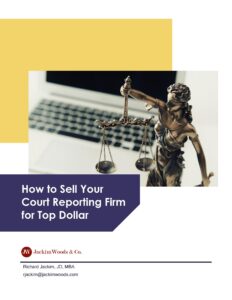
I’m pleased to announce that I just published a free 17-page guide to Selling your Court Reporting Firm for Top Dollar. This comprehensive guide provides a lot of useful information as you begin to think about selling your court reporting firm, so I thought it would be helpful to provide an outline of the topics covered.
The Ultimate Guide to Selling Your Court Reporting Firm for Top Dollar

Introduction
- Overview of the complexities and rewards of selling a court reporting firm.
- Importance of understanding the sale process and strategizing your exit for a profitable transition.
Understanding the Value of Your Court Reporting Firm
- Critical first step: Determine your firm’s fair market value.
- Unique and valuable aspects of your business in the marketplace.
- Importance of working with an experienced business broker in the court reporting sector.
Key Non-Financial Factors Affecting Firm Value
- Client Base:
- A diverse and loyal client base as a primary asset and value driver.
- Contractors/Reporters:
- The significance of the experience and tenure of court reporters or contractors.
- Technology:
- Adoption of cutting-edge technologies as a value enhancer.
- Administrative Staff:
- The expertise and experience of administrative staff in maintaining service quality.
Valuation Rules of Thumb
- The role of EBITDA and SDE in business valuation.
- Importance of accounting for unique value drivers and detractors for accurate valuation.
The Sales Process
- Steps and timeline for selling a court reporting firm.
- Importance of preparation for a smooth and successful sale.
Preparing Your Firm for Sale
- Financial statement organization and operational process documentation.
- Emphasizing the necessity of up-to-date accounting and efficient operational processes.
Marketing Your Court Reporting Firm
- The need for creating a compelling offering package and contacting potential buyers.
- Utilizing digital marketing and leveraging the expertise of business brokers.
The Role of Professional Advisors
- Advantages of working with a business broker specialized in court reporting firms.
- Mitigating risks such as low-ball offers, due diligence failures, and distractions during the sales process.
Navigating Negotiations
- Understanding buyer motivations and maintaining flexibility.
- The importance of negotiating with multiple buyers simultaneously to secure the best deal.
Choosing the Right Buyer
- Balancing financial offers with cultural and operational fit.
- Evaluating different types of buyers: big box firms, regional firms, and individual entrepreneurs.
The Closing Process
- Steps involved in closing the sale, including due diligence and finalizing financial terms.
- The significance of definitive legal documents at closing.
Embracing the Future Post-Sale
- The emotional and practical aspects of life after selling your business.
- Opportunities for new ventures and personal growth.
Conclusion
- Summarizing the journey of selling a court reporting firm.
- Encouragement to contact a professional advisor for guidance and valuation.
Download Your Copy Here
Download your free copy of this useful white paper here.
About the Author and Jackim Woods & Co.
 Rich Jackim is an attorney, investment banker, and entrepreneur. For the last 25 years, Rich has been providing boutique investment banking services to small and middle-market companies in the court reporting and litigation support sector.
Rich Jackim is an attorney, investment banker, and entrepreneur. For the last 25 years, Rich has been providing boutique investment banking services to small and middle-market companies in the court reporting and litigation support sector.
In addition to running a successful M&A advisory firm, Rich founded a successful training and certification company called the Exit Planning Institute, which he sold to a private family office in 2012.
Rich is also the author of the critically acclaimed book, The $10 Trillion Dollar Opportunity: Designing Successful Exit Strategies for Middle Market Businesses. It became an Amazon best-seller in the business consulting category the year it was published.
Jackim Woods & Co offers skilled mergers and acquisitions advisory services to court reporting firms, digital reporting and videography firms, court reporting schools, eDiscovery companies, and legal contract staffing companies in both sell-side and buy-side transactions. Jackim Woods & Co has arranged over 100 successful transactions, ranging in value from less than one million to more than eighty million dollars.
If you own an court reporting firm or litigation support company and are interested in exploring your options, I would welcome an opportunity to speak with you. There is no cost or obligation to you and all discussions are completely confidential.
Feel free to contact me at 224-513-5142 or rjackim@jackimwoods.com.
